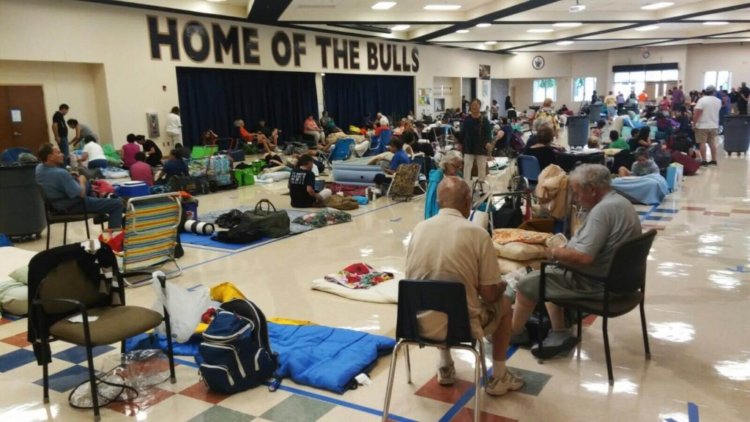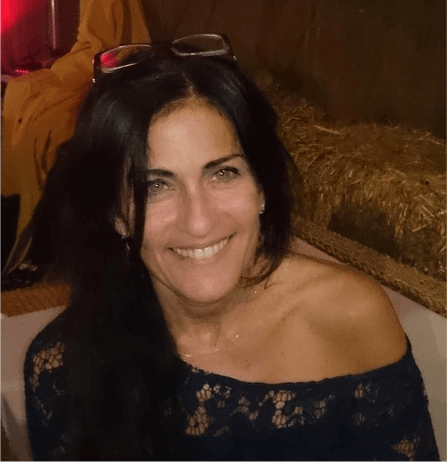
[Image of the shelter as it was filling up]
In the space between sleep and waking, I occasionally confuse if I am in Jerusalem or Palm Beach. One morning, when an explosive boom shook me awake, “Shit,” was my first thought. But when I opened my eyes, I understood that it was not a bus or cafe blowing up in my Jerusalem neighborhood. It was thunder overhead and I was in Florida. Even during wakefulness, there is a space in the divide between these two lives, where words, images, scents, sounds and tastes transport me back and forth, reflecting the one world in the other.
When I heard that a catastrophic hurricane would likely be hitting Florida, memories flooded my mind, not of natural disasters, but of Jerusalem and nearby: Excavating my gas mask from storage and taping sheet plastic to cover the rickety windows when Iraq threatened Jerusalem with poison gas; my two children hugging their knees in the stairwell of our apartment when missiles were incoming from Gaza to Jerusalem; sitting on a Jerusalem bus after my first son was born, hoping the bus wouldn’t blow up; staring at photos that mothers posted on Twitter in nearby Sderot and Gaza during the Gaza War of 2014–the Palestinian mothers putting their children to sleep next to bathtubs and the Israeli mothers children hiding in “safe rooms”; the father in Gaza who cried on the phone with me while I interviewed him, after his windows broke from an Israeli tank; the young man in Gaza who, during the same period, posted from his bathroom that he didn’t know if he would survive the night’s shelling in his neighborhood and then the next day he was gone; millions of Syrian mothers across the border cowering with their children, not knowing when or where the next bomb would fall; and the hundreds of Syrian children I met who have lost their homes and country to war, but were learning about peaceful leadership and conflict resolution from volunteers.
After countless hours hunting for water, batteries, flashlights, non-perishable food, and wood to board up some windows; taking some valuable papers, jewelry and computer keys to the bank safety deposit box; and mailing draft chapters of a manuscript to a friend for safe-keeping, the mental images and thoughts persisted. Jerusalem. Sderot. Gaza. Syria. Florida. Millions (billions?) of people around the world, from children to great grandparents, living under the stress of not knowing exactly when they are going to be pummeled or how badly by war, natural disaster, bullets, bombs, rape, torture… All the same, wanting shelter, safety, water, freedom. Life.
Meanwhile, facing Irma, I had to be practical. We wanted to board up a corner of the apartment attached to the larger bathroom, so we wouldn’t have to sleep around the bathtub. Stores were sold out of wood, metal sheets and concrete screws and workers were overbooked. We were lucky that we had three days to prepare and that we did find some material and get a few windows covered. Not everyone succeeded. But as #Irma continued its approach as a category 4-5 hurricane – strong enough to damage a wall or roof or send a tree through a piece of plywood and glass window – we fled to a high school being used as a hurricane shelter. We lugged sheets, pillows, books, cards and games, clothes, toothbrushes, toothpaste, soap, alcohol gel, vitamins and natural medicines, non-perishable foods (rice and rye crackers, almond and sunflower butters, hemp milk and cereal, dry fruits and nuts, protein bars, cans of sardines, kale chips, carrots, tomatoes and coconut water) and cases of water, luxuries that most people fleeing war and disaster can not find, let alone shlep to a safe place.
On the third night, hidden behind hurricane-proof walls and windows, I woke up laughing around 3am. On a cold, stone floor, surrounded closely by several hundred people of every age and background and all kinds of lights and noises, my bones were aching and something was scratching my back. It was a few packages of mustard that someone had inadvertently dropped inside my make-shift bed.
When I finally fell back asleep an old man screaming “I can’t get up!” awoke me. We rushed to take him to the bathroom, where we found people helping half a dozen other older people. So many gave each other blankets, chairs, advice, toys, food, water, medicine and every kind of help one can and can’t imagine.
With blue tape designating plots for groups or families, people were carefully guarding their bags and phones. But with each passing day, as suspicions relaxed, more personal belongings laid scattered and unattended. People were making jokes about how we were the best shelter and who they would “vote off the island.”
We were all exhausted, but when I had trouble sleeping I found that saying a gratitude list calmed me or made me laugh. “Thank you for these brilliant earplugs, for my son’s navy gym shorts that I wear over my head as an eye mask, for the hurricane windows and shelter here, which so many people hiding from natural disaster and war do not have. Thank you that there is enough food and water and toilets that work, that people are cleaning up, that it is not disgusting, that nobody here has a hacking cough. Thank you for the kindness of strangers…”

I will never forget the people I met that week: those who helped me find wood for the windows, workers who stayed late to size the wood to fit more windows and told me I gave them “too much” for a tip, the friend I haven’t seen in 30 years who urged me to fly to Maine to stay with her. And the people in the shelter: Tiffany, the toothless baby who made everyone laugh; Mati, the 95 year-old dressed in her striped tee-shirt and bootcut jeans who gives great advice; the 85-year-old beauty with blue eyes and long white hair whose aide I witnessed verbally abusing and physically neglecting her and whose eyes watered when I hugged her; the neighbors on the left and right who shared their chairs and bedding to put under our sheets; the kids in front of us who entertained mine; Joseph, the fit 80-year-old taking care of his developmentally disabled granddaughter day and night with endless patience and smiles, holding her all night in the beach chair they slept in; the father on holiday from Istanbul who had not yet seen his newborn son in the hospital around the corner; the young and possibly homeless guy who said he had been kicked out of the hospital with a broken leg and the retired woman next to him helping take care of him; the retiree who rubbed his wife’s face all night if necessary whenever she became filled with rage or had insomnia; the paramedics who helped the people going through drug withdrawal; the librarians who stepped in to run the shelter with two hours training, and the volunteers who guarded the doors and made thousands of sandwiches. And so on.

Every kind of person was there, as always, yet with no walls to hide our frailties.
In the rare moments of fear, I remembered a woman I interviewed once in Jerusalem who told me her motto was to “trust everyone.” How much more kindly people behave when you treat them with trust.
I am humbled by my generous neighbors who never pushed or cut in line, and I am thankful for the shelter, food, running water, safety and freedom that so many around the world still need. I also remembered an article I had read a few days earlier about a man in a hurricane shelter during Harvey in Texas, who decided to recruit volunteers to help the elderly and frail. Perhaps because of the inspiration he gave me, I spent my days looking for people who needed help. This made me realize how many neighbors need a helping hand but will not speak up. I am even thankful for the little things, like packages of mustard that made sandwiches taste better and, I don’t know why, made me laugh my head off, finding them in my bed that night when it was so hard to sleep.
Most of all, I remember that space between east and west, like any two places or peoples, that many consider an inseparable divide. Yet to me the divide is often a reflection of both places and peoples, because we are all basically the same. In war, disaster and tragedy, it becomes even more clear that we all want the same things, no matter what coincidences of nation, religion, culture, race, gender, or orientation we were born into. We want the best for ourselves and our families, but at the same time, still have the power to help others. It may sound unreasonable or impossible, and of course there are horror stories. Yet, countless times, I have witnessed during ongoing periods of conflict, war and tragedy with Israelis, Palestinians and Syrians, for example, and in the US, like last week, that it is easy to find the best of humanity, even in the worst situations.
 Lauren Gelfond Feldinger, an award-winning journalist and grantee of the Pulitzer Center on Crisis Reporting, has written widely on the Israeli-Palestinian conflict for the last two decades and has also written about Syrian nonviolent activists involved in conflict resolution. Her work has appeared in such publications as The BBC News Magazine, The Daily Beast, Elle, Haaretz and The Jerusalem Post Magazine and has been quoted in dozens of non-fiction books. She is currently working on a book about life in Jerusalem and the region and is a contributor to The Art Newspaper in London, while helping take care of her elderly parents who retired to Florida.
Lauren Gelfond Feldinger, an award-winning journalist and grantee of the Pulitzer Center on Crisis Reporting, has written widely on the Israeli-Palestinian conflict for the last two decades and has also written about Syrian nonviolent activists involved in conflict resolution. Her work has appeared in such publications as The BBC News Magazine, The Daily Beast, Elle, Haaretz and The Jerusalem Post Magazine and has been quoted in dozens of non-fiction books. She is currently working on a book about life in Jerusalem and the region and is a contributor to The Art Newspaper in London, while helping take care of her elderly parents who retired to Florida.


Grok Nation Comment Policy
We welcome thoughtful, grokky comments—keep your negativity and spam to yourself. Please read our Comment Policy before commenting.